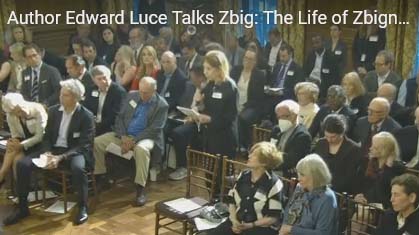By Lucy Komisar
May 20, 2025
At the Council on Foreign Relations May 14, 2025, I asked Ed Luce, author of a new book about Jimmy Carter’s National Security Advisor Zbigniew Brzezinski, who admitted he supported the mujaheddin in Afghanistan to draw in the Russians and make it “their Vietnam,” whether his Polish hatred of Russia became a permanent element of U.S. foreign policy. (In the end, after the Russians left in a year, the U.S. went in and it was their Vietnam for 20 years.)

Clip is from 44:20 minutes to 47:50 minutes.
Edward Luce is U.S. national editor and columnist of the Financial Times. Before that he was the FT’s Washington Bureau chief. And before that, he was the speechwriter for U.S. Treasury Secretary Lawrence H. Summers in the Clinton administration. (How do you spell Establishment?)
Here is the text:
David Ignatius (moderator): Lucy.
Lucy Komisar: I’m Lucy Komisar. I’m a journalist. Brzezinski exhibited a traditional Polish hatred of Russia. Did you, in your book, deal with the matter of the interview he gave to a French publication where he admitted that he had provided weapons to the mujaheddin in Afghanistan in order to bring in the Russians and make it their Vietnam.
Of course, they were there for a while and then it became the Americans’ Vietnam. But, is this an example of what seems to have been established as Russophobia as an essence of U.S. foreign policy?
Ed Luce: Oh, well that’s a big question. So yeah, he gave an interview to the Nouvel Observateur in 1998, in which he said before 9/11, they’d help, not give weapons.
So, there was a CIA covert action in mid-1979, in July 1979, 6 months before the Soviet invasion, in which it was $695,000. Not a huge amount, but it obviously went quite far in dirhams or whatever the Afghan currency was in terms of propaganda, leaflets, radio equipment to the insert rural insurgency that was going on against the Soviet backed backed government in Kabul, that he wasn’t actually equipping yet.
The Carter administration wasn’t providing arms at that point. They did after the invasion covertly, because it didn’t have congressional approval., and after 9/11, he was accused, I think, a little bit unfairly of being the godfather of Al-Qaeda., which I think that was a bit of a stretch. Because Al-Qaeda was formed in 1987, six years after Carter left office.
But yeah, there were trade-offs there. I mean, he and they, they sort of strongly, Carter talked the language of God quite naturally to Muslim countries that were backing the mujaheddin including Pakistan. To him it came naturally.
As Zbig it was entirely instrumental. But he talked the same language and it did sound a little bit different after 9/11, or after 1993, the World Trade Center, than it did before, you know, there were trade-offs there.
Lucy Komisar: and as the essential part of American foreign policy. Bring it back to him.
Ed Luce: I think he was a Sovietphobe. I mean, I think he loved Russia. I mean, he read, loved reading Russian literature and many Russian friends. Clearly there was a definite Polish sort of sense of history there though. And so I wouldn’t say he consistently loathed Russians or Russian culture. And whether it’s the sort of guiding principle of U.S. foreign policy, this is a deep philosophical debate. I would take some issue with the premise of your question, but I’m not sure I can answer it very quickly.
Luce never answered whether he dealt with Brzezinski’s Afghanistan plot in his book. Haven’t read it; must assume he didn’t. And I clearly wasn’t talking about Russian culture (Chekhov, Tchaikovsky and the Bolshoi), but about the Russian government and its leaders.
At a Paul Warnke memorial event, it is appropriate to note that Warnke, who was director of the U.S. Arms Control and Disarmament Agency, opposed the expansion of NATO to the east, a continuation of Brzezinski’s policies, which was undertaken to provoke, even threaten, Russia.
That led to the current U.S. proxy war against Russia in Ukraine, that cold warriors date to the 2022 Russian invasion but which actually began with the 2014 U.S.-cultivated coup against an elected pro-Russian president. (Washington supplied more than cookies.)
That was not discussed by Luce or brought up by his questioner, David Ignatius, the Washington Post columnist whose “insider” stories have led him to be considered the media voice of the CIA.


